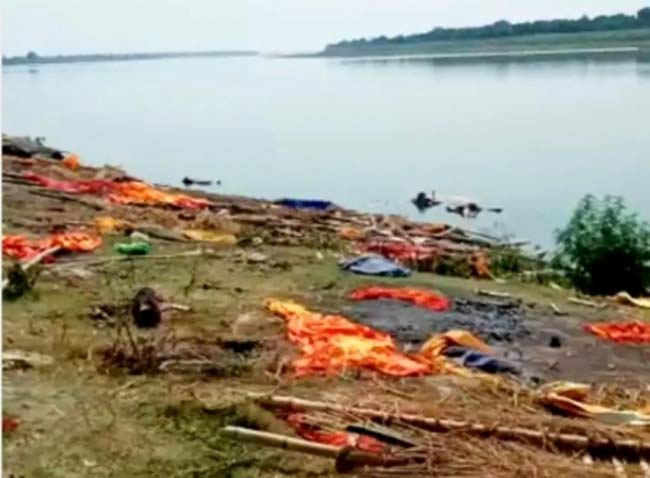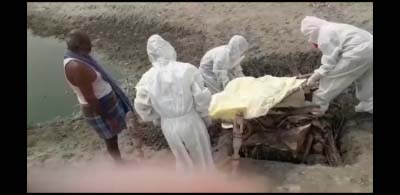
The visual images of dead bodies floating in the Ganges in Bihar and Uttar Pradesh have justifiably stirred the nation’s conscience notwithstanding the bureaucratic recriminations to shift the responsibility from one state to the other. Likewise, the media coverage of the dumping of bodies in secluded places like river banks, ponds, fields and farms, and the gruesome sight of dogs and vultures having a feast on these decomposing bodies has led to the much required debate on the rights of the dead with the National Human Rights Commission taking the lead. Reportedly, in some cases, the deadCovid-19 patients have simply been abandoned by their own kith and kin for cremations/burials (and the associated rituals) cost money which the latter did not have. True, a society which does not know to honour its dead is civilisationally deficient and culturally morose. However, it would be wrong to put the entire blame on the families of the dead and their utter lack of pathos and pity. The latter’s apparent insensitivity, nay, cruelty, are in no way matters of their psychological dispositions and temperamental flaws. Rather, they necessitate a thorough-going critique of some of the fundamental building blocks of our society and polity.
 A society like ours has, in fact, never considered human dignity as an indivisible right of every human being. Our entire edifice of caste system has historically been built around the idea that different groups of people are endowed with differential entitlements to human dignity. Some have more of it; and, some have less of it, and rightly so. Not only India, other societies too have had other axes of‘ distributing’ dignity unevenly across varied groups and communities. So, in the US, ‘Negroes’ obviously were seen as possessing less of human dignity compared to the “Whites” in the same way as low castes in India were accorded less of it in relation to higher castes. Some other societies too have had other bases of what sociologists call principles of social stratification – class, status, lineage, or the aristocratic purity of blood. In other words, most of the societies have had in-built systemic barriers that allowed multiple forms of discrimination, and consequently, could never create conditions for the efflorescence of the universal idea of human dignity to gain ground and flourish.
A society like ours has, in fact, never considered human dignity as an indivisible right of every human being. Our entire edifice of caste system has historically been built around the idea that different groups of people are endowed with differential entitlements to human dignity. Some have more of it; and, some have less of it, and rightly so. Not only India, other societies too have had other axes of‘ distributing’ dignity unevenly across varied groups and communities. So, in the US, ‘Negroes’ obviously were seen as possessing less of human dignity compared to the “Whites” in the same way as low castes in India were accorded less of it in relation to higher castes. Some other societies too have had other bases of what sociologists call principles of social stratification – class, status, lineage, or the aristocratic purity of blood. In other words, most of the societies have had in-built systemic barriers that allowed multiple forms of discrimination, and consequently, could never create conditions for the efflorescence of the universal idea of human dignity to gain ground and flourish.
 Admittedly, things started to change for the better with the advent of modernity. The mass mobilisations leading to American and French revolutions made it amply clear that collective action could alter the dead weight of past traditions. For the first time in human history, popular will (as against the divine will) gained entry in our political lexicon as a new template of governance and statecraft. This centrality of the people in this-worldly (secular) scheme of things added a new momentum to the onward march of human history. Gone were the days of the kings and the priests.People as a category came on its own giving birth to new notions of political sovereignty and the ideals of republicanism. And, naturally, mass politics became the key arena where contending visions of an ideal society and polity would unfold, and vie for popular support. Put it differently, the struggles around the idea of human dignity will have to be waged in the domain of polity, and not elsewhere. One finds it a tad surprising that the ongoing debate around abandoned dead bodies misses this crucial point, and thereby, absolves the political leadership of their monumental failure in creating such enabling conditions where human dignity, both in life and death could be substantively realised.
Admittedly, things started to change for the better with the advent of modernity. The mass mobilisations leading to American and French revolutions made it amply clear that collective action could alter the dead weight of past traditions. For the first time in human history, popular will (as against the divine will) gained entry in our political lexicon as a new template of governance and statecraft. This centrality of the people in this-worldly (secular) scheme of things added a new momentum to the onward march of human history. Gone were the days of the kings and the priests.People as a category came on its own giving birth to new notions of political sovereignty and the ideals of republicanism. And, naturally, mass politics became the key arena where contending visions of an ideal society and polity would unfold, and vie for popular support. Put it differently, the struggles around the idea of human dignity will have to be waged in the domain of polity, and not elsewhere. One finds it a tad surprising that the ongoing debate around abandoned dead bodies misses this crucial point, and thereby, absolves the political leadership of their monumental failure in creating such enabling conditions where human dignity, both in life and death could be substantively realised.
It is not that we have not progressed towards the ideal of universal human dignity. After all, universal adult franchise is nothing but an acknowledgement of the lofty idea of human dignity irrespective of one’s station in life. Our constitutional provisions emphasising non-discrimination on grounds of caste, religion, language and the like are the embodiments of the same ideal. However, despite almost three quarters of a century after Independence, we are miles away from guaranteeing adequate entitlements to health, education, and livelihood for larger sections of our people. Much of our current concern about dignified death will remain vacuous unless and until we focus on the idea of a dignified living. And, the onus of ensuring dignified living for its citizens squarely falls on the state with its ambiguous pretensions of republican welfarism.
This translates into forcing the state to live up to its own avowed commitments. This means fighting for our rights as citizens. This calls for political mobilisations to hold the state accountable to its citizens. We need to ask for universal access to affordable and quality healthcare. We need to demand opportunities for gainful employment. We need to fight against the skewed distribution of national resources that favours few at the cost of many. We need to ask as to why in so many villages patients are put on a glucose drip under a Neem tree under unhygienic conditions. Or, why are there unattended patients crawling on hospital floors! Is not that the utter disrespect for human dignity? Not able to live a dignified life for lack of access to enabling resources that make dignified living possible is ultimately a political question. It is political to the core as it is inextricably linked to the systemic distribution of privileges, life chances and opportunities across different strata that constitutes a polity. Let us not deflect our attention from the pre-eminence of politics by bringing in inane matters of religious rituals, sacred funerary rites and the responsibilities of the survivors.
We need to interrogate the ‘system’ for making Indian villages such inhospitable places to live in. For how long will we keep these villages in a state of lack – no doctors, no paramedical staff, no health facilities, no ambulances, no oxygen, no medicines, and no accountable and responsive government? We deprive most of them from even a modicum of physical and social infrastructure for decades, and then suddenly start the rhetoric of containing the rural spread of Covid-19. May be, our political establishment has acquired the magic wand which will fix all the problems of decrepit rural healthcare overnight! Is not it ironical that while we fail to provide even the basic medical care to the needy, or arrest millions of avoidable deaths, we shed crocodile tears on the non-availability of a hearse to carry a dead body to a crematorium in a dignified way. Indeed, without any iota of doubt, the dead deserve dignity but so do the ones who are alive. An ambulance is as much a guarantor of dignity for a sick person as a hearse is for a dead. A well-equipped hospital is as valuable for the preservation of our dignity as a well-organised cremation/burial ground. And, we have to fight for both simply because they are deeply connected. And, to fight for them we have to have more of politics, rather than less of it. The general middle-class indifference to politics has made us myopic. They do not allow us to see the deep linkages between our private worries and public troubles as the sociologist C. Wright Mills had once famously proclaimed.
In our times, much of what we get in life, or fail to get, is decided by politics. The latter offers us a blueprint for secular emancipation. It has taken the huge sacrifices of generations of scholars and activists to put secular politics a la collective action at the centre stage of human history. We should not let it slip away from our hands lest democracy’s demagogues and populist authoritarians push us back into the grooves of identity politics of multiple hues. We want access to good things of life, here and now. We have no intention to believe a great many peddlers of unfounded dreams of beautiful lives after death. We want dignity, of course in death, but also in life. And, this dignity, as history teaches us, will not come for asking. We will have to achieve it through our protracted collective struggles. Let us fight for this dignity by advancing claims for substantive citizenship. The mere formal political equality will not do. We have to bring in a concerted focus on equity to eliminate multiple forms of systemic discrimination that are avoidable, but persist. Without engaging with varied forms of systemic discrimination, and without foregrounding political economy of resource allocation and distribution, our concern for dignity is likely to be more of a posturing. The demands of human dignity, undoubtedly, are inextricably wedded to the demands of an equitable secular politics. Nothing less will do.
Manish Thakur is Professor, Public Policy and Management Group, and the Dean (New Initiatives & External Relations) at the Indian Institute of Management Calcutta. Views are personal.
